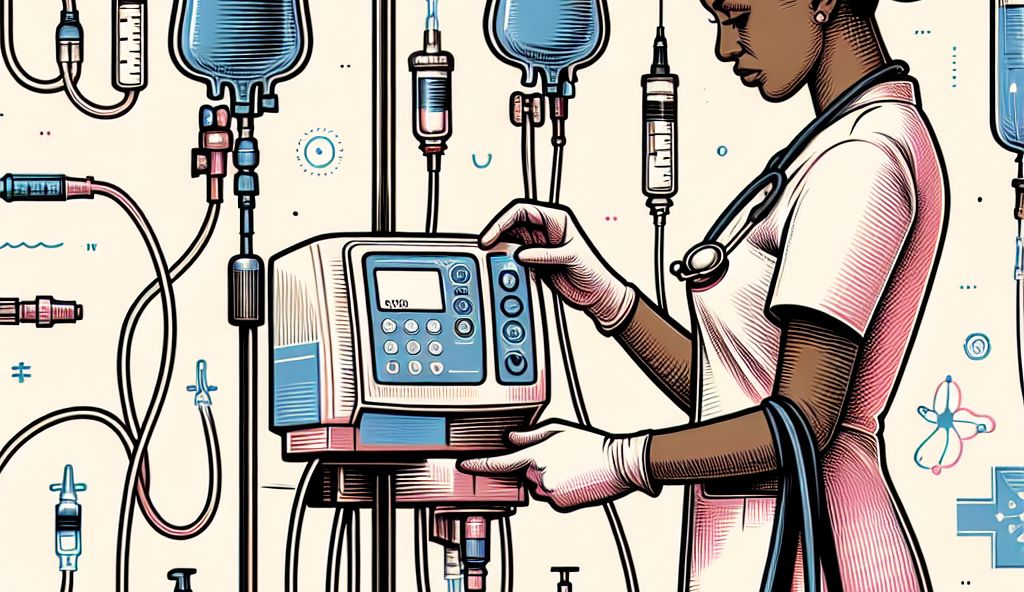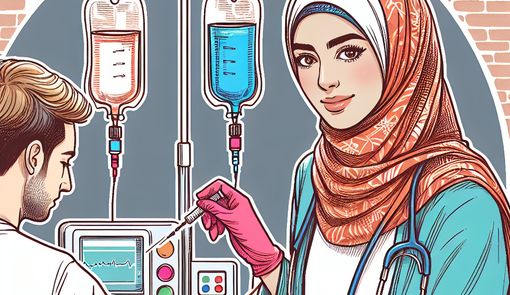The Essential Skills Every IV Therapy Nurse Practitioner Must Have

Intravenous (IV) therapy has become a pivotal component of modern healthcare, enabling the administration of life-saving medications, fluids, and nutrients directly into a patient's bloodstream. As such, the role of the IV Therapy Nurse Practitioner (NP) is increasingly significant in various clinical settings. These specialized nurses are tasked with a range of responsibilities, from inserting IV lines and monitoring patient responses to educating patients about their treatments. To succeed in this demanding field, an IV Therapy NP must hone a comprehensive skill set that encompasses clinical proficiency, detailed knowledge, and a keen understanding of patient care dynamics. This article delves into the essential skills that every IV Therapy Nurse Practitioner must possess to excel in their role.
Clinical Expertise
At the core of IV therapy nursing is clinical expertise. NPs must have a deep understanding of anatomy and physiology, particularly regarding the vascular system and the potential complications that can arise when administering IV therapy. They should be adept at performing vascular access procedures with precision to minimize patient discomfort and prevent infections or other complications. Mastery in the use of ultrasound technology to assist in vein selection and catheter placement is becoming increasingly important in the field.
In addition to procedural skills, IV Therapy NPs must have a comprehensive understanding of the medications and fluids they administer, including pharmacology, dosages, and the physiological implications for the patient. The ability to recognize and manage adverse reactions quickly is critical, as complications from IV therapy can be severe and require immediate attention.
Patient Assessment and Monitoring
Patient assessment is an ongoing requirement in IV therapy nursing. NPs must be able to perform thorough evaluations of patients before, during, and after IV treatments. This includes monitoring vital signs, assessing the insertion site for signs of phlebitis, infiltration, or extravasation, and evaluating the patient's overall response to treatment. Effective monitoring ensures that any potential issues are identified swiftly and addressed to prevent harm.
Patient Education and Advocacy
Education and advocacy are integral to the role of an IV Therapy NP. They must be capable of explaining complex treatment protocols in a manner that patients can understand, thus empowering them to participate in their care actively. It includes educating patients about potential side effects, how to care for their IV site, and when to seek medical attention. Advocacy for patient rights and best practices in IV therapy is equally important, as NPs often collaborate with other healthcare professionals to optimize patient outcomes.
Technical Proficiency
Technical proficiency is essential for an IV therapy nurse. This includes not only the hands-on skills necessary for IV insertion and maintenance but also familiarity with the various types of IV equipment and technology used in treatment. Knowledge of electronic medical records and data management systems is increasingly necessary as healthcare continues to digitize.
Interpersonal Communication
Clear and compassionate communication is vital for any nurse, and IV Therapy NPs are no exception. These professionals must communicate effectively with patients, families, and other healthcare team members. Navigating sensitive conversations, providing emotional support, and coordinating with other clinicians are all part of the nurse's daily responsibilities. As such, strong interpersonal skills are a non-negotiable aspect of the job.
Problem-Solving and Critical Thinking
The unpredictable nature of healthcare requires IV Therapy NPs to be excellent problem solvers and critical thinkers. They must be able to assess situations accurately, anticipate potential complications, and make sound decisions often under pressure. Being able to adapt quickly to changing conditions and improvise when necessary can make a significant difference in patient care.
Time Management and Organizational Skills
Given the complexity of their role, IV Therapy NPs must be exceptional at managing their time and staying organized. They typically care for multiple patients simultaneously, with varying needs and treatment regimens. Effective prioritization, diligent documentation, and maintaining an organized workflow are skills that can ensure the efficiency and safety of IV therapy procedures.
Cultural Competence
Understanding and respecting cultural differences in healthcare are critical for providing compassionate and effective care. IV Therapy NPs must be able to communicate and interact with patients from diverse backgrounds, recognizing cultural sensitivities and health-related beliefs that might influence a patient's perspective on IV therapy.
Commitment to Continued Education and Professional Development
The healthcare industry is ever-evolving, and IV Therapy NPs must commit to continuous learning to maintain their expertise. Participation in specialized training programs, certification courses, and staying abreast of the latest evidence-based practices are ways that NPs can ensure their skills remain sharp and relevant.
By integrating these vital skills, an IV Therapy Nurse Practitioner will not only deliver high-quality care but also contribute significantly to the advancement of IV therapy practices. The combination of technical savvy, a robust knowledge base, and a compassionate approach to patient interaction makes the IV Therapy NP an indispensable ally in the healthcare team and a guardian of patient well-being.
Frequently Asked Questions
1. What educational background is required to become an IV Therapy Nurse Practitioner?
To become an IV Therapy Nurse Practitioner, individuals typically need to have a Bachelor of Science in Nursing (BSN) degree and be a licensed Registered Nurse (RN). Following this, they may pursue a Master of Science in Nursing (MSN) with a specialization in IV Therapy or a related field. Additionally, obtaining certification in IV therapy may be required or beneficial depending on the state or employer.
2. How do IV Therapy Nurse Practitioners stay updated with the latest advancements in the field?
IV Therapy Nurse Practitioners stay current by engaging in ongoing professional development activities such as attending conferences, workshops, and webinars. They may also subscribe to nursing journals, participate in online forums or discussion groups, and pursue additional certifications or advanced degrees.
3. What are the common challenges faced by IV Therapy Nurse Practitioners in their daily practice?
IV Therapy Nurse Practitioners may encounter challenges such as difficult vascular access in patients with small or fragile veins, managing multiple IV lines in critically ill patients, preventing infections and complications associated with IV therapy, and addressing patient anxiety or discomfort during procedures. Effective communication with patients and collaboration with other healthcare team members can help mitigate these challenges.
4. How important is teamwork and collaboration for IV Therapy Nurse Practitioners?
Teamwork and collaboration are essential for IV Therapy Nurse Practitioners as they often work closely with physicians, other nurses, pharmacists, and support staff to ensure coordinated and effective patient care. By fostering a collaborative environment, IV Therapy NPs can enhance communication, improve patient outcomes, and contribute to a positive work culture.
5. What are the potential career growth opportunities for IV Therapy Nurse Practitioners?
IV Therapy Nurse Practitioners may explore various career paths such as becoming nurse educators, clinical nurse specialists, nurse managers or administrators, or even pursuing roles in research or healthcare consulting. Additionally, leadership positions within IV therapy departments or quality improvement initiatives offer avenues for professional growth and advancement.
Further Resources
For readers interested in further enhancing their knowledge and skills as IV Therapy Nurse Practitioners, here are some valuable resources and references:
- Books:
- "Infusion Therapy Made Incredibly Easy!" by Lippincott Williams & Wilkins
- "Manual of I.V. Therapeutics: Evidence-Based Practice for Infusion Therapy" by Lynn Dianne Phillips and Lisa Gorski
- Online Courses:
- Professional Organizations:
- Journals and Publications:
- Journal of Infusion Nursing
- Journal of the Association for Vascular Access
- Webinars and Conferences:
- Clinical Guidelines:
- Podcasts:
- "The Infusion Room" - A podcast by the Infusion Nurses Society
- "Vascular Access Specialty Podcast" - A podcast by the Association for Vascular Access
- Networking Platforms:
These resources offer a wealth of information, networking opportunities, and avenues for continuous professional development in the field of IV therapy nursing. Continuing education and staying updated with the latest practices are essential for excelling in this specialized area of healthcare.






